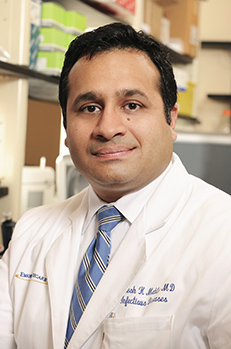
Final results of an international study in adults hospitalized with COVID -19 show that treatment with the experimental antiviral drug remdesivir resulted in faster recovery, fewer days on oxygen and lower progression to ventilation compared with placebo.
The results of the National Institute of Allergy and Infectious Diseases-sponsored ACTT-1 (Adaptive COVID-19 Treatment Trial) were published Thursday Oct. 8 in the New England Journal of Medicine.
“The final results build on what was published in May, and demonstrate that remdesivir treatment results in a faster time to recovery than previously reported,” says Aneesh Mehta, MD, one of the lead Emory University investigators for the study. “The strongest evidence for benefit was in those patients on oxygen when they started remdesivir.”
The ACTT-1 study began in February, and the final results include participants from 45 sites in the United States and 15 sites in Europe and Asia. Emory clinical sites enrolled 103 participants out of 1062, more than any other site in the world.
“The work of our team contributed not only to the advancement of research and clinical standards, but also to helping many of our patients recover and return home to their families,” says Nadine Rouphael, MD, co-lead investigator at Emory.
Mehta is chief of infectious diseases at Emory University Hospital, and associate professor of medicine at Emory University School of Medicine. Rouphael is interim director of the Hope Clinic at Emory Vaccine Center, and professor of medicine at Emory University School of Medicine.
For the treatment of COVID-19, remdesivir was the first antiviral medication significantly associated with a shorter time to recovery. The drug has now become the standard of care since publication of the initial results. The new analyses help clinicians optimize patient care and determine the best time to begin treatment.
In addition, clinical trials now underway combine remdesivir with other investigational agents, such as antiviral monoclonal antibodies or anti-inflammatory drugs. The Food and Drug Administration has issued remdesivir two emergency use authorizations for the treatment of hospitalized COVID-19 patients.
In the ACTT-1 study, patients who received remdesivir had a median recovery time of 10 days, as compared with 15 days among those who received placebo. In addition, those who received remdesivir were 50 percent more likely to demonstrate clinical improvement at day 15.
The study was not designed to analyze mortality rates. However, mortality was 6.7 percent with remdesivir and 11.9 percent with placebo by day 15, and 11.4 percent with remdesivir and 15.2 percent with placebo by day 29.
A sub-group analysis of patients requiring low-flow oxygen at the start of their treatment showed that remdesivir could reduce mortality by 70 percent by day 29. Overall, remdesivir seems to be safe, in that serious adverse events were reported less frequently in the remdesivir group.
The clinical trial was supported by the Infectious Diseases Clinical Research Consortium (IDCRC) through the National Institute of Allergy and Infectious Diseases (grants: UM1AI148576, UM1AI148684). The IDCRC, consisting of the Vaccine Treatment and Evaluation Units (VTEUs) and the IDCRC Leadership Group, was formed in 2019 to support the planning and implementation of infectious diseases clinical research that efficiently addresses the scientific priorities of NIAID.
The consortium includes infectious diseases leaders and clinical researchers from Emory University, University of Maryland School of Medicine, Baylor College of Medicine, Cincinnati Children’s Medical Center and University of Cincinnati, FHI360, Fred Hutchinson Cancer Research Center, Johns Hopkins University, Kaiser Permanente Washington Health Research Institute, New York University, Saint Louis University, Vanderbilt University Medical Center, University of Alabama at Birmingham, University of Rochester, University of Washington, and NIAID.
